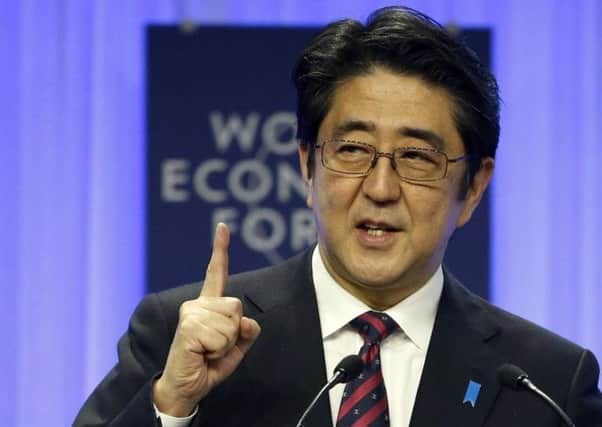Japan: Davos call to avoid ‘World War I mistakes’


Mr Abe made the comment on the sidelines of the World Economic Forum in Davos, Switzerland.
He told reporters that China and Japan were in a “similar situation” to Britain and Germany before 1914, whose close economic ties had not prevented the conflict.
Advertisement
Hide AdAdvertisement
Hide AdHe also said China’s steady rise in military spending was a major source of regional instability.
Chief cabinet secretary Yoshihide Suga yesterday said that Mr Abe’s comments should by no means be interpreted to mean that war between the two Asian giants was possible.
He noted that Mr Abe had said dialogue and the rule of law, not armed forces and threats, were needed for peace and prosperity in Asia.
Sino-Japanese ties, long plagued by what Beijing sees as Japan’s failure to atone for its occupation of parts of China in the 1930s and 1940s, have worsened recently due to a territorial row, Tokyo’s mistrust of Beijing’s military build-up and Mr Abe’s December visit to a shrine that critics say glorifies Japan’s wartime past.
Mr Suga, mentioning that this year is the 100th anniversary of the start of the First World War, said Mr Abe had said Britain and Germany fought despite their deep economic ties.
Asked if China and Japan might clash militarily, he replied that such a conflict “would be a great loss not only for Japan and China but for the world and we need to make sure such a thing would not happen”, according to Mr Suga.
China and Japan, the world’s second- and third-largest economies respectively, have strong business ties and bilateral trade that was worth nearly $334 billion (£200bn) in 2012, according to Japanese figures.
China criticised Mr Abe’s historical reference. “It would be better to face up to what Japan did to China before the war and in recent history than to say stuff about pre-First World War British-German relations,” foreign ministry spokesman Qin Gang told a news conference in Beijing.
Advertisement
Hide AdAdvertisement
Hide AdUS deputy secretary of state William Burns, on a visit to Beijing this week, stressed that all sides should avoid unilateral action to assert maritime claims, and that China should work with its neighbours to reduce tension in the East and South China seas.
China’s Defence Ministry said an air force patrol in the East China Sea Air Defence Identification Zone, set up by Beijing late last year despite protests from Japan, South Korea, the United States and others, had recently encountered several “foreign” military aircraft and given them verbal warnings.
It did not say which country the aircraft were from, but added that China had “investigated their identity”.
In a message yesterday to local Chinese-language papers ahead of the lunar new year, Mr Abe said Japan had “built a free and democratic country and taken the path of peace” since the end of the Second World War.
“Nothing has been changed in the policy of continuing to uphold this position,” he said, according to a Japanese version provided by the prime minister’s office.
“I believe you, who live in Japan, can understand this fundamental stance of ours.”